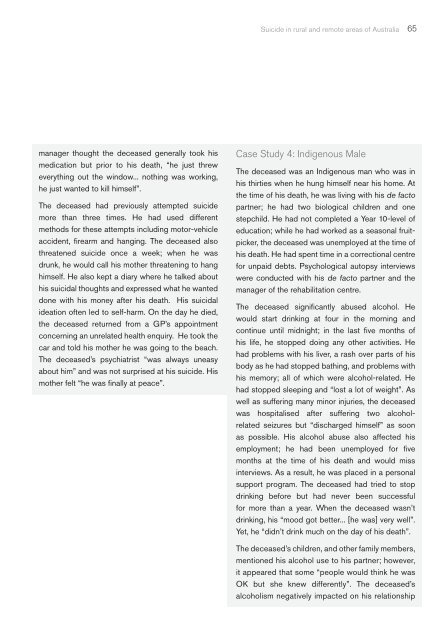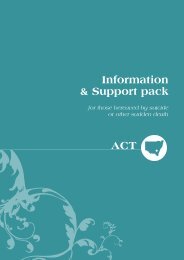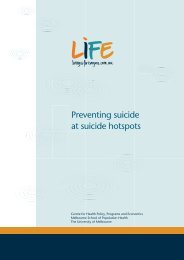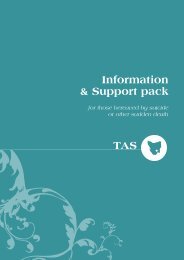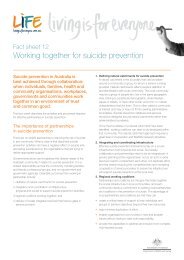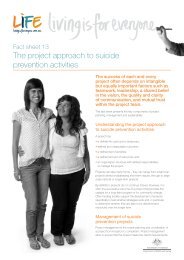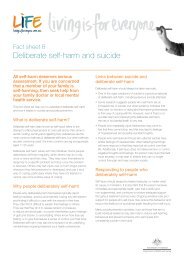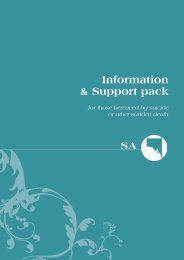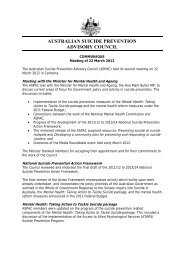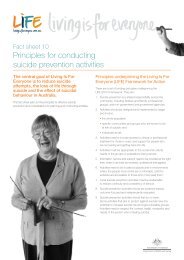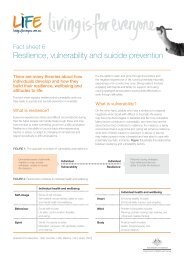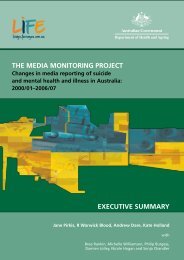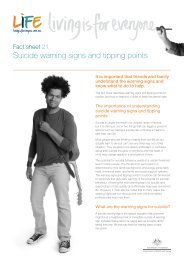SUICIDE in RURAL & REMOTE AREAS of AUSTRALIA - Living is for ...
SUICIDE in RURAL & REMOTE AREAS of AUSTRALIA - Living is for ...
SUICIDE in RURAL & REMOTE AREAS of AUSTRALIA - Living is for ...
Create successful ePaper yourself
Turn your PDF publications into a flip-book with our unique Google optimized e-Paper software.
Suicide <strong>in</strong> rural and remote areas <strong>of</strong> Australia 65<br />
manager thought the deceased generally took h<strong>is</strong><br />
medication but prior to h<strong>is</strong> death, “he just threw<br />
everyth<strong>in</strong>g out the w<strong>in</strong>dow... noth<strong>in</strong>g was work<strong>in</strong>g,<br />
he just wanted to kill himself”.<br />
The deceased had previously attempted suicide<br />
more than three times. He had used different<br />
methods <strong>for</strong> these attempts <strong>in</strong>clud<strong>in</strong>g motor-vehicle<br />
accident, fi rearm and hang<strong>in</strong>g. The deceased also<br />
threatened suicide once a week; when he was<br />
drunk, he would call h<strong>is</strong> mother threaten<strong>in</strong>g to hang<br />
himself. He also kept a diary where he talked about<br />
h<strong>is</strong> suicidal thoughts and expressed what he wanted<br />
done with h<strong>is</strong> money after h<strong>is</strong> death. H<strong>is</strong> suicidal<br />
ideation <strong>of</strong>ten led to self-harm. On the day he died,<br />
the deceased returned from a GP’s appo<strong>in</strong>tment<br />
concern<strong>in</strong>g an unrelated health enquiry. He took the<br />
car and told h<strong>is</strong> mother he was go<strong>in</strong>g to the beach.<br />
The deceased’s psychiatr<strong>is</strong>t “was always uneasy<br />
about him” and was not surpr<strong>is</strong>ed at h<strong>is</strong> suicide. H<strong>is</strong><br />
mother felt “he was fi nally at peace”.<br />
Case Study 4: Indigenous Male<br />
The deceased was an Indigenous man who was <strong>in</strong><br />
h<strong>is</strong> thirties when he hung himself near h<strong>is</strong> home. At<br />
the time <strong>of</strong> h<strong>is</strong> death, he was liv<strong>in</strong>g with h<strong>is</strong> de facto<br />
partner; he had two biological children and one<br />
stepchild. He had not completed a Year 10-level <strong>of</strong><br />
education; while he had worked as a seasonal fruitpicker,<br />
the deceased was unemployed at the time <strong>of</strong><br />
h<strong>is</strong> death. He had spent time <strong>in</strong> a correctional centre<br />
<strong>for</strong> unpaid debts. Psychological autopsy <strong>in</strong>terviews<br />
were conducted with h<strong>is</strong> de facto partner and the<br />
manager <strong>of</strong> the rehabilitation centre.<br />
The deceased signifi cantly abused alcohol. He<br />
would start dr<strong>in</strong>k<strong>in</strong>g at four <strong>in</strong> the morn<strong>in</strong>g and<br />
cont<strong>in</strong>ue until midnight; <strong>in</strong> the last fi ve months <strong>of</strong><br />
h<strong>is</strong> life, he stopped do<strong>in</strong>g any other activities. He<br />
had problems with h<strong>is</strong> liver, a rash over parts <strong>of</strong> h<strong>is</strong><br />
body as he had stopped bath<strong>in</strong>g, and problems with<br />
h<strong>is</strong> memory; all <strong>of</strong> which were alcohol-related. He<br />
had stopped sleep<strong>in</strong>g and “lost a lot <strong>of</strong> weight”. As<br />
well as suffer<strong>in</strong>g many m<strong>in</strong>or <strong>in</strong>juries, the deceased<br />
was hospital<strong>is</strong>ed after suffer<strong>in</strong>g two alcoholrelated<br />
seizures but “d<strong>is</strong>charged himself” as soon<br />
as possible. H<strong>is</strong> alcohol abuse also affected h<strong>is</strong><br />
employment; he had been unemployed <strong>for</strong> fi ve<br />
months at the time <strong>of</strong> h<strong>is</strong> death and would m<strong>is</strong>s<br />
<strong>in</strong>terviews. As a result, he was placed <strong>in</strong> a personal<br />
support program. The deceased had tried to stop<br />
dr<strong>in</strong>k<strong>in</strong>g be<strong>for</strong>e but had never been successful<br />
<strong>for</strong> more than a year. When the deceased wasn’t<br />
dr<strong>in</strong>k<strong>in</strong>g, h<strong>is</strong> “mood got better... [he was] very well”.<br />
Yet, he “didn’t dr<strong>in</strong>k much on the day <strong>of</strong> h<strong>is</strong> death”.<br />
The deceased’s children, and other family members,<br />
mentioned h<strong>is</strong> alcohol use to h<strong>is</strong> partner; however,<br />
it appeared that some “people would th<strong>in</strong>k he was<br />
OK but she knew differently”. The deceased’s<br />
alcohol<strong>is</strong>m negatively impacted on h<strong>is</strong> relationship<br />
GriffithBook FINAL 20/09.<strong>in</strong>dd 65<br />
15/11/12 4:28 PM


